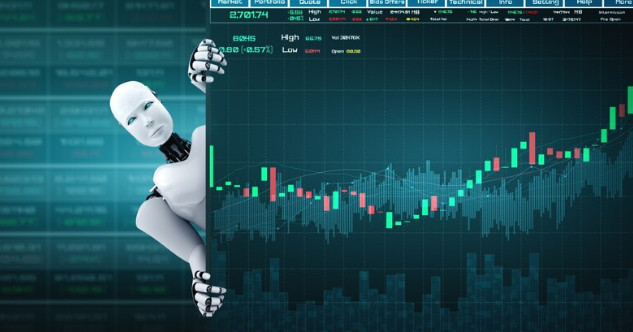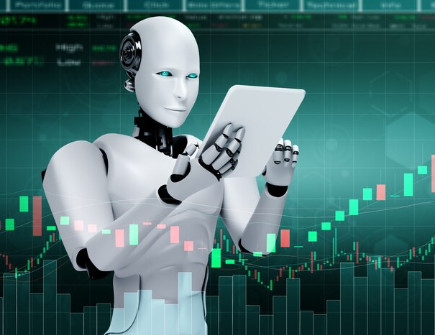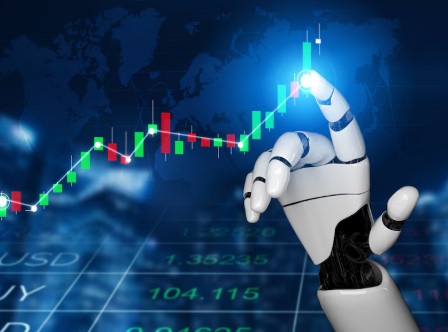views
The financial landscape is experiencing a seismic shift as AI in options trading becomes the cornerstone of modern investment strategies. Artificial intelligence is fundamentally changing how traders approach options markets, offering unprecedented precision, speed, and analytical capabilities that were unimaginable just a decade ago.
Understanding How Artificial Intelligence Works in Options Trading
How does artificial intelligence work in options trading? The answer lies in AI's ability to process vast amounts of market data, identify complex patterns, and execute trades with superhuman speed and accuracy. Unlike traditional trading methods that rely on human intuition and basic technical analysis, AI systems can simultaneously analyze thousands of variables, including market sentiment, historical price movements, volatility patterns, and macroeconomic indicators.
Modern AI trading systems utilize sophisticated neural networks that continuously learn from market behavior. These systems can detect subtle market inefficiencies that human traders might miss, enabling them to capitalize on profitable opportunities in real-time. The integration of natural language processing allows AI to interpret news events, earnings reports, and social media sentiment, translating this information into actionable trading signals.
The Power of Machine Learning in Options Prediction
The use of machine learning in options prediction has transformed how traders forecast market movements. Machine learning algorithms excel at identifying non-linear relationships in financial data, making them particularly effective for options trading where price movements are influenced by multiple complex factors.
Machine learning for financial markets employs various techniques including:
- Deep Learning Models: These neural networks can process multiple layers of market data to predict option price movements with remarkable accuracy
- Reinforcement Learning: AI agents learn optimal trading strategies through trial and error, continuously improving their performance
- Ensemble Methods: Combining multiple ML models to create more robust and reliable predictions
- Time Series Analysis: Specialized algorithms that understand temporal patterns in options pricing
These machine learning approaches have proven especially effective in volatility forecasting, a critical component of successful options trading. By analyzing historical volatility patterns and market conditions, ML models can predict future volatility with greater precision than traditional methods.
AI-Powered Tools Transforming Options Trading in 2025
The market for AI-powered tools for options trading 2025 has exploded, offering traders sophisticated platforms that combine cutting-edge technology with user-friendly interfaces. These tools range from comprehensive trading platforms to specialized analytical software designed for specific trading strategies.
Leading best AI options trading platforms now offer features such as:
- Real-time market scanning and opportunity identification
- Automated risk management and position sizing
- Advanced portfolio optimization algorithms
- Predictive analytics for earnings and event-driven trading
- Integrated backtesting capabilities with historical data
The development of these platforms often involves partnerships with artificial intelligence app development service providers who specialize in creating robust, scalable trading applications. These development services ensure that trading platforms can handle high-frequency data processing while maintaining the reliability required for financial applications.
Automation: Can AI Automate Options Trading Strategies?
Can AI automate options trading strategies? Absolutely. Modern automated trading software for options can execute complex multi-leg strategies with precision and speed impossible for human traders. These systems can simultaneously monitor hundreds of options chains, identifying and executing profitable trades based on predefined criteria.
AI trading algorithms can automate various options strategies including:
- Delta-Neutral Strategies: Automatically adjusting positions to maintain market neutrality
- Volatility Trading: Exploiting discrepancies between implied and realized volatility
- Earnings Plays: Executing strategies around earnings announcements based on historical patterns
- Arbitrage Opportunities: Identifying and capitalizing on price discrepancies across different markets
The sophistication of these automated systems continues to evolve, with some platforms now offering subscription-based AI trading tools that provide retail traders access to institutional-grade automation capabilities.
AI's Broader Impact on Finance and Investment Management
Artificial intelligence in finance extends far beyond individual trading strategies. Institutional investors and hedge funds are increasingly adopting custom AI algorithms for hedge funds that can manage entire portfolios with minimal human intervention. These systems can process alternative data sources, including satellite imagery, social media sentiment, and economic indicators, to make investment decisions.
Enterprise AI for options management is becoming essential for financial institutions that need to manage complex options portfolios while maintaining regulatory compliance. These enterprise solutions can monitor risk exposure across thousands of positions, automatically rebalancing portfolios to maintain desired risk parameters.
The Technology Behind AI Trading Solutions
The development of effective AI trading solutions for investors requires sophisticated technology infrastructure. Companies specializing in android app development service and ios app development service are creating mobile applications that put AI-powered trading capabilities directly in traders' hands.
These mobile app development services focus on creating intuitive interfaces that mask the complexity of underlying AI algorithms while providing traders with powerful analytical tools. The challenge lies in making sophisticated AI capabilities accessible to traders of all experience levels.
Key technological components include:
- Cloud Computing Infrastructure: Enabling real-time processing of massive datasets
- API Integration: Connecting to multiple data sources and execution venues
- Security Protocols: Protecting sensitive financial data and trading algorithms
- Mobile Optimization: Ensuring seamless performance across devices
Advantages and Considerations of AI-Powered Options Trading
AI brings numerous advantages to options trading:
Speed and Efficiency: AI systems can analyze market conditions and execute trades in milliseconds, capturing opportunities that disappear quickly in volatile markets.
Emotion-Free Trading: AI eliminates emotional decision-making, consistently following predetermined strategies without fear or greed influencing decisions.
Complex Pattern Recognition: AI can identify subtle patterns in vast datasets that human traders might overlook, leading to more informed trading decisions.
Risk Management: Advanced algorithms can continuously monitor portfolio risk and automatically adjust positions to maintain desired risk levels.
However, traders should also consider potential limitations:
- Market Regime Changes: AI models trained on historical data may struggle during unprecedented market conditions
- Over-Optimization: Systems may become too specialized for specific market conditions
- Technology Risk: System failures or connectivity issues can impact trading performance
- Regulatory Considerations: Compliance requirements may limit certain AI trading strategies
The Future Landscape of AI in Options Trading
The future of AI in options trading looks increasingly sophisticated. Emerging technologies like quantum computing promise to further enhance AI's analytical capabilities, while advances in natural language processing will enable more nuanced interpretation of market-moving events.
Integration with blockchain technology may provide new ways to verify and execute trades, while the Internet of Things (IoT) could provide additional data sources for AI analysis. The democratization of AI tools means that strategies once available only to large institutions are becoming accessible to individual traders.
Getting Started with AI-Powered Options Trading
For traders interested in incorporating AI into their options trading strategies, several paths are available:
- Research Existing Platforms: Evaluate established AI trading platforms that offer options capabilities
- Start with Paper Trading: Test AI strategies with virtual money before committing real capital
- Understand the Technology: Learn about the AI techniques being used to make informed decisions
- Consider Professional Development: Work with firms that specialize in AI trading system development
Conclusion
AI in options trading represents one of the most significant technological advances in financial markets. From sophisticated machine learning for financial markets to user-friendly AI-powered tools for options trading 2025, artificial intelligence is democratizing advanced trading strategies while providing institutional-grade capabilities to individual investors.
The integration of AI with options trading is not just a trend but a fundamental shift in how markets operate. Whether through automated trading software for options, subscription-based AI trading tools, or custom AI algorithms for hedge funds, artificial intelligence is reshaping the investment landscape.
As we move forward, the combination of advancing AI technology, improved mobile app development services, and innovative artificial intelligence app development service providers will continue to push the boundaries of what's possible in options trading.
Ready to leverage AI for your options trading strategy? Contact AI trading experts to discover how custom artificial intelligence solutions can transform your investment approach and unlock new opportunities in today's dynamic markets.

























Comments
0 comment